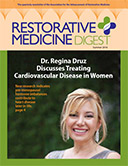Following widespread efforts to eradicate iodine deficiency disorders (IDD) worldwide — first launched in the 1990s and continuing today — epidemiologists noted an unexpected phenomenon: a significant uptick in the rates of both autoimmune thyroiditis (Hashimoto’s disease) and thyroid cancer. Initial wisdom suggested that because eradication efforts favored universal salt iodization (USI) programs, excess iodine was likely to blame.
At the same time, the U.S. Centers for Disease Control’s National Health and Nutrition Examination Surveys (NHANES) found that between 1988 and 1994, Americans’ iodine intake had actually decreased by more than 50 percent.1 Yet rates of both conditions continued to increase.
Researchers began to wonder, what gives?
In a recent retrospective study published in the 2016 Journal of Restorative Medicine2, authors Robyn Murphy, BSc, ND et al examine this question. What they found is intriguing: based on the body of in vitro and observational evidence reviewed, they posit that iodine deficiency, rather than iodine excess, plays a significant role in the development of disease.
Hashimoto’s disease
In a review of 13 patients with overt hypothyroidism and autoimmune thyroiditis, the authors report lower-than-normal concentrations of thyroid iodine compared to healthy subjects -- 2.3 mg versus 10 mg, respectively. “This correlation suggests that iodine deficiency may be a causative factor in patients with autoimmune thyroiditis,” they note.
While the mechanisms remain poorly understood, it appears that in iodine-deficient individuals, a specific breakdown in the thyroid’s auto-regulatory process results in a failure to limit excess iodine — exposing the thyroid to oxidative stress during iodine repletion. Further, experimental studies demonstrate that this same breakdown produces excess H2O2, which triggers the release of inflammatory cytokines and ultimately induces the production of anti-thyroid peroxidase (TPO) and anti-thyroglobulin (TG). Therefore, the authors hypothesize, “[i]odine deficiency, plus the reintroduction of iodine, is the cause of autoimmune thyroiditis.”
Thyroid cancer
Although epidemiological studies remain controversial, the authors report a correlation between low iodine intake and two subtypes of thyroid cancer: papillary and follicular carcinoma.
Citing animal studies that demonstrate increased thyroid stimulating hormone (TSH) and thyroid tumors in 54-100 percent of subjects on iodine-deficient diets, they suggest that low iodine intake may lead to chronic TSH secretion and thyroid hyperplasia — which increases the risk for malignant transformation. While these effects have not yet been confirmed in humans, in vitro studies show a decrease in the proliferation of thyroid carcinoma cells in the presence of specific iodolactones — suggesting that optimal levels of iodine can reduce the threat of malignancy.
While these preliminary findings suggest a strong correlation between iodine deficiency and both Hashimoto’s and thyroid cancer, the authors caution that additional research must be done — including on what role, if any, environmental factors play in triggering disease.
Interestingly, the authors also found evidence that supplemental iodine — in specific combination with other nutrients and extracts — can actually benefit patients suffering from autoimmune thyroid disorders. In order to identify safe dosing levels, more research, and the development of medical standards, will be necessary.
Journal of Restorative Medicine, 2016 Vol 5
References
- https://www.cdc.gov/media/pressrel/ad981001.htm
- Murphy, R., Turek, C., and Arseneau, L. The role of iodine deficiency and subsequent repletion in autoimmune thyroid disease and thyroid cancer. Journal of Restorative Medicine 2016
